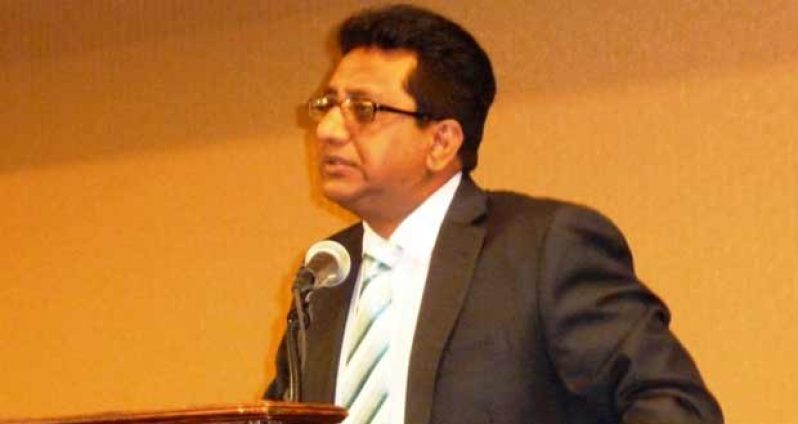Passing the Anti-Money Laundering/Countering the Financing of Terrorism (AML/CFT) act is critical to the future well-being of Guyana and to all Guyanese.Guyana has an international obligation to enact legislation, which is constitutional; harmonized with the laws of other member countries in its group; able to pass peer review by those countries; and in accord with the Caribbean Financial Action Task Force (CFATF) guidelines (which in turn are based on guidelines issued by their parent body, the FATF based in Paris).
“The whole purpose of the exercise is to create a network of laws and rules that are common to every country. The act requires you to collaborate with all countries of the world to share information.” So said Guyana’s Attorney General at a forum on the subject in Toronto last week Friday.
According to the Attorney General, Guyana is the only country in the Western Hemisphere that has not enacted the requisite legislation – a consequence of the combined opposition stalling the AML/CFT bill, with its one-seat majority in the house.
This disruption of the country’s business, however, is not just another one of the run of the mill counterproductive actions by the opposition that people have come to expect.
Blocking the government’s efforts to the meet requirements mandated by the CFATF runs the significant risk of setting in motion a series of worldwide processes and sanctions, which start almost imperceptibly, but have long lasting effects that are extremely difficult to reverse. This would devastate the local economy and the livelihood of Guyanese – not to mention the harm to CARIFTA and the ripple effects on foreign direct investment from countries like Canada, which has a stake in the mining industry.
The lenses through which AML/CFT is viewed today emerged out of the huge paradigm shift that occurred following the 9/11 terrorist attack in the United States. There was an overnight change in the perspective of the of the world community with regard to security, terrorism and the financing of terrorism through the drug and arms trade.
The United States quickly responded with the US PATRIOT Act (Uniting and Strengthening America by Providing Appropriate Tools Required to Intercept and Obstruct Terrorism).
Other developed countries followed with their own new legislation or amended existing statutes to deal with new realities. Regulatory bodies with international reach and sweeping powers also reacted in like fashion. The cumulative results of the actions taken by these influential economies and global regulatory bodies has been a network of standards applicable to both developed countries with sophisticated information systems, and developing countries with less technology, and fewer resources, and different legislative architectures.
These standards continue to evolve and to be further buttressed by treaties, resolutions, conventions and input from other interested bodies. Work is ongoing to refine, better integrate regulations, and to make changes to counter elaborate new methods manufactured by those seeking to circumvent the regulations.
The leading agencies that set standards include The United Nations (UN); The Financial Action Task Force (FATF); The Basel Committee on Banking Supervision; The International Association of Insurance Supervisors; The International Organisation of Securities; and The Egmont Group of Financial Intelligence units. Other bodies involved include the powerful International Monetary Fund (IMF), The Commonwealth Secretariat, and the organisation of American States (CICAD) to name a few.
CFATF conducted a review of all the Caribbean and Latin American countries under their supervision in 2010 to address concerns that the legislation on the books of regional countries was not producing convictions or even charges. The reviewed examined each country’s policy position, legislative architecture and technical facilities with regard to its ability to meet AML/CTF requirements.
The body issued their findings and recommendations/requirements to regional countries including Guyana in 2011. Minister Nandlall said that Guyana has since satisfied most of the non-legislative requirements, but has seen the legislative component of the requirements continuously blocked in the house.
He said that in 2012 the government engaged a consultant to draft amendments to legislation on the books required by CFATF. The amendments were brought before the house in April 2013 where it has since been tied up by various delaying tactics.
The country consequently missed an original May 2013 CFATF deadline and now a February 2014 deadline to submit its amended AML/CTF bill to the governing body.
This failure by Guyana’s legislature places the country in serious jeopardy of being blacklisted by the FATF.
Blacklisting by the FATF would trigger a circular disseminated all over the world advising that Guyana is an unsafe country to do business – and carrying with it all the associated stigma of terrorism, money laundering and drug and arms trading.
Furthermore, any country, which continues to do business with Guyana, can themselves come under scrutiny and possible sanctions.
The minister said that financial institutions are already beginning to take precautions. Much more documentation is being required from businesses and individuals who have to prove that their transactions are not related to money laundering or terrorism.
Several ordinary Guyanese have related to him stories of hardship and delays in being able to receive lifeline remittances. He said that remittances for last December were down over fifty percent. To put this in context of the extent to which remittances are important to Guyana, the World Bank reports than annual remittances to the country totalled US$469 million in 2012.
(By Ron Cheong)




.png)









